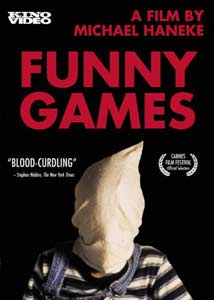Funny Games
 Austrian writer/director Michael Haneke is a filmmaker who loves to polarize his audience. He wants to lure the audience into complicity with what we are watching, but he then, like Jean-Luc Godard before him, wants to remind us of the artificiality of all that we see onscreen. As such, his films often manipulate our emotions to create a more emotional response to the images on film. Funny Games (1997) is the second Haneke film I’ve viewed (The Piano Teacher being the first), and if they continue to be up to this quality, I’ll keep seeing more.
Austrian writer/director Michael Haneke is a filmmaker who loves to polarize his audience. He wants to lure the audience into complicity with what we are watching, but he then, like Jean-Luc Godard before him, wants to remind us of the artificiality of all that we see onscreen. As such, his films often manipulate our emotions to create a more emotional response to the images on film. Funny Games (1997) is the second Haneke film I’ve viewed (The Piano Teacher being the first), and if they continue to be up to this quality, I’ll keep seeing more.Concerned with a family who vacations at their lake house, Haneke gives us a brief glimpse of their everyday interaction before launching into the existential horror. Two twentysomething men soon terrorize the family, shattering the father’s kneecap with a golf club, and eventually hold the mother, father, and young son hostage. All this occurs while the villains, Paul (Arno Frisch) and Peter (Frank Giering), occasionally talk to the camera and note the necessary conventions for the family’s survival. This breaking of the fourth wall creates an odd dissonance, since we are thus reminded of the archetypal nature of the characters, yet they are so primal that we remain nonetheless invested in them.
Once the villains begin to kill the family off, though, Haneke reveals just how he has exploited our assumptions. As Paul steps out into the kitchen, a shot is fired and Haneke refuses to immediately show us who has been murdered. Haneke wants to hold out the suspense of who was shot a moment longer, which signals our understanding that we as an audience yearn to know the dirty details. That the death is finally revealed to be the family’s son is just that much more disconcerting. We get one single take, without cut scenes or close-ups, for the next four to five minutes, and the suspense here as the parents work to escape is indeed riveting.
Though the images are frequently grotesque, they are never exploitative without a purpose. Haneke often frames his camera in long shots, holding our eyes on disconcerting images until we are not so much viscerally fascinated but emotionally repulsed that we ever wanted to see the image. That is why the infamous “Where’s the remote control” scene is so effective. It suspends our preconceived understanding while remaining true to Haneke’s brutal vision--delivering an uncompromising story of brutality minus any redemption.
In many ways, this film is a precursor to David Cronenberg’s A History of Violence in that it utilizes genre archetypes, lets us know that the filmmakers know that they’re utilizing them, and then subverts them. Yet the film is more articulate in its dissection of the dual nature of vengeance, both as it corresponds to the characters in the film and to the audience, and it is masterfully aware of every sensation that it elicits from moviegoers.
Funny Games is recommended to anyone who is adventurous in their viewing habits, or to anyone who wants to have an in-depth conversation following their viewing. It’s a punishing but rewarding film (and it should be seen before Hollywood releases the remake of it next year, directed by Haneke no less!).
Funny Games: 8/10

0 Comments:
Post a Comment
<< Home